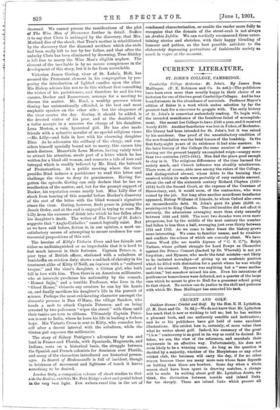C URRENT LITERAT ITRE.
ST. JOHN'S COLLEGE, CAMBRIDGE.
Cambridge College histories: 13t. John's. By James Bass Mullinger. (F. E. Robinson and Co. 5s. net.)—The publishers have been even more than usually happy in their choice of an historian for one of the two great Cambridge Colleges. And he has been fortunate in the abundance of materials. Professor Mayor's edition of Baker is a work which makes selection by far the greatest task for a successor to grapple with. The early history of St. John's is somewhat melancholy reading. To begin with, the intended munificence of the foundress failed of accomplish- ment. She meant her College to have £500 a year, and it received barely £170. Another benefactor was lost in Fisher, of Rochester. His library had been intended for St. John's, but it was seized by his murderer. One proof of the unsatisfactory condition of the new foundation was the brief tenure of the headship. In the first forty-eight years of its existence it had nine masters. In the later history of the College the same number of masters— leaving out the present happily uncompleted reign—occupy more than two centuries (1679-1881). Men find the place good enough to stay in it. The religious differences of the time harmed the society much, and Church influence was steadily mischievous. There were, of course, able men among the rulers of the College, and distinguished alumni, whose debts to the training they received within its walls were probably of very variable amount. About the end of the sixteenth century Richard Clayton (1595= 1612) built the Second Court, at the expense of the Countess of Shrewsbury, and, it would seem, of the contractors, who were ruined by the job. Not long after another munificent benefactor appeared, Bishop Williams of Lincoln, to whom Oxford also owes no inconsiderable debt. St. John's gave its plate (2,065 oz. avoirdupois) to King Charles. The civil troubles did not affect it seriously, the admissions averaging more than sixty annually between 1644 and 1660. The next two decades were even more prosperous, but by the middle of the next century the number had fallen to less than a half, averaging just over thirty between 1751 and 1765. As we come to later times the history grows more interesting. We come to familiar names, and to rivalries and conflicts the echoes of which are scarcely silent. We have James Wood (the nee inutile Lignum of "C. S. C."); Ralph Tatham. whose gallant struggle for Lord Powys as Chancellor against the Prince Consort (backed by Dr. Whewell) is not yet forgotten ; and Hymers, who made the fatal mistake—not likely to be imitated nowadays—of giving up an academic position which be filled with distinction for a parish where he was wholly out of his element. Hymers was anything but a "mere mathe- matician," but somehow missed his aim. Even his intentions of posthumous benevolence were defeated, not a quarter of the large sum which he meant to give to Hull for a grammar school going to that object. No review can do justice to the skill and patience with which Mr. Bass Mullinger has executed his task.






































 Previous page
Previous page